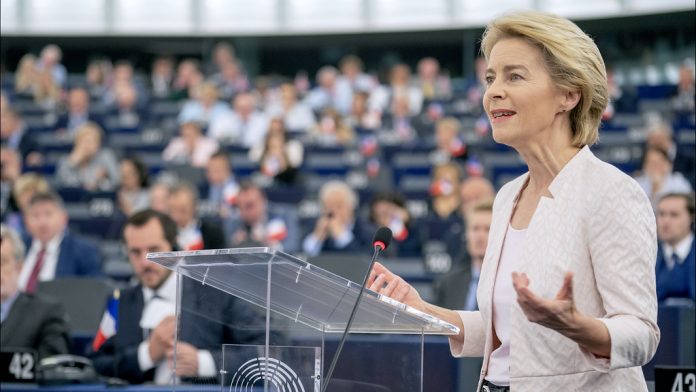
fIn something resembling an escalation, European Commission President von der Leyen yesterday threatened to block vaccine exports, unless the EU ‘gets its fair share’. The threat would only apply to countries with higher vaccination rates than Europe, notably the United Kingdom and the United States. The last time the EU did this, was during the oil crisis of the 1970s. It would mean a toughening up from the EU’s existing vaccine export scheme, adding extra grounds, like reciprocity and proportionality.
As an explanation, Von der Leyen said:
“We want to see reciprocity and proportionality in exports, and we are ready to use whatever tool we need to deliver on that. (…) This is about making sure that Europe gets its fair share.”
It should be kept in mind that this is merely a European Commission proposal, which she’ll submit to EU government leaders at next week’s Summit.
Her proposal already received backing from French President Macron, “in particular to require reciprocity.”
It seems like the target of von der Leyen is the U.K., rather than the U.S., given her statement that “we have observed that in the last six weeks, actually 10 million doses by now have been exported to the U.K…We’re still waiting for doses to come from the U.K.” She added that with the U.S., on the other hand, “there is a seamless flow back and forth of pre-products, raw materials and drug substance. (…) So there reciprocity is given.”
An EU spokesperson however pointed out that due to the EU’s newly invented “proportionality principle” also countries that do not produce vaccines may be hit. According to von der Leyen, this principle is about the question “whether exports to countries who have higher vaccination rates than us are still proportionate”. An export ban may therefore also affect the likes of Israel, Chile, the U.S., the United Arab Emirates, Bahrain, Serbia, Qatar, Turkey and Morocco.
Then, the proposal clearly targets the United Kingdom, which quickly shot back, with UK Foreign Minister Dominic Raab saying this kind of stuff “is normally what the UK and EU team up with to reject when other countries with less than democratic views than our own engage in that kind of brinkmanship”. In other words, this is reminiscent of banana republic – style protectionism.
Legally dodgy
In doing so, the EU Commission intends to use the infamous article 122 of the EU Treaty, which according to Nicolai von Ondarza of German think tank SWP “has more and more become a go-to article to enable the EU to enact crisis decisions even without a clear legal base”. Back in May 2010 this article, which allows the EU to take action in case of “severe difficulties caused by natural disasters or exceptional occurrences”, was used to create a bailout fund, the “EFSM”, which was used to bail out Eurozone governments. Thereby, also non-Eurozone member states became financially liable for financial mismanagement enabled by Eurozone membership and all the easy money it unleashed for governments that would previously not have been able to spend as freely.
The UK accepted the EFSM and the legal basis tacitly, as it was decided in the precise weekend where there was some kind of a power vacuum as power transitioned from Labour PM Gordon Brown to Conservative PM David Cameron. Incoming UK Finance Minister George Osborne didn’t make a fuzz, which proves to be a mistake, as the EU Commission acquired a taste for using it again.
This doesn’t make sense
Darren McCaffrey, a Euronews journalist, who has often come to the defense of the European Commission in the whole vaccine saga, where it performance was less than stellar, went all out against von der Leyen, pointing out that many EU vaccine exports to the UK are Pfizer vaccines, wondering: “[The] EU is angry with #AstraZeneca on lack of delivers (understandable) but might block Pfizer vaccines exports in turn?”.
Indeed, given that the issue at stake is with AstraZeneca, the focus should be here, whereby it’s not a given that AstraZeneca has done anything wrong, as its production is – opposed to Pfizer- decentralised, meaning that production is taking place close to where the vaccine is being administered. Moreover, also the UK has suffered AstraZeneca supply shortfalls.
In the first place, “reciprocity” and “proportionality” restrictions for vaccine exports wouldn’t actually guarantee that the EU gets many more vaccines, according to The Times’ EU correspondent Bruno Waterfield, who points out that looking at AstraZeneca production in the UK, since February, not more than 700.000 vaccines would have been exported to the EU on a proportional basis.
It may backfire
The EU really may be playing with fire here. According to WSJ-Berlin correspondent Bojan Pancevski, the “EU’s current main suppliers, Pfizer-BioNTech, would see their EU vax production stop within weeks if the UK responds with blocking raw material exports”.
That’s assuming the EU wouldn’t be so unwise to start hindering exports to the United States, which may be possible under von der Leyen’s definition of “reciprocity”, as already a few million vaccines were exported from the EU to the US, even if she doesn’t intend to ruffle U.S. President Joe Biden’s feathers.
What von der Leyen has clearly overlooked, is what such actions may do to the complex supply chains of big pharma.
Thankfully, some opposition is already visible. German social democrat MEP Bernd Lange, who chairs the European Parliament’s trade committee, criticized the Commission’s plans, stating that the EU Commission’s plan “is a sign of helplessness rather than strength.”, instead suggesting that “legal action (…) on AstraZeneca’s lack of contract fulfillment” and political talks with the UK and the U.S. are the way forward.
Let’s hope EU government leaders push back against this latest outburst of European Commission protectionism, which actually undermines vaccine supply to the EU and also does not make the EU a more attractive place for pharma companies to invest in. Mistakes have been made, so the one thing the EU Commission and member states can now miss is the necessary international goodwill to secure sufficient amounts of vaccines.












